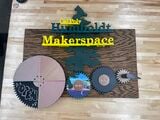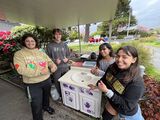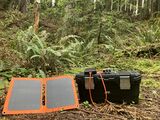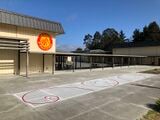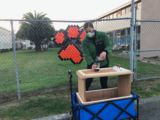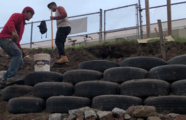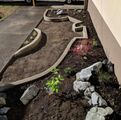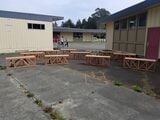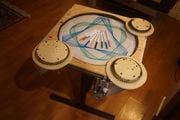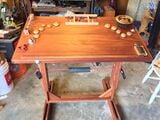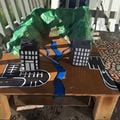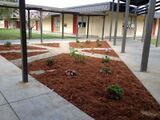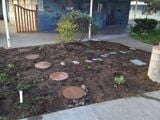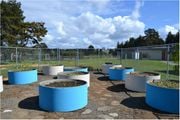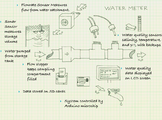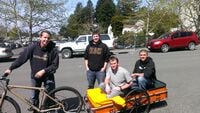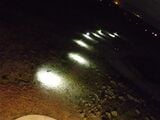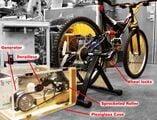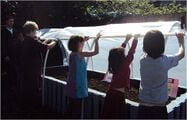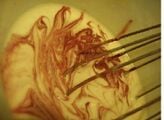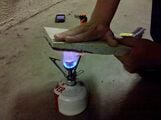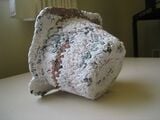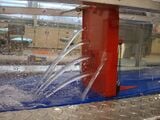Welcome to ENGR 205 Introduction to Design taught by Lonny Grafman. This is a 3-credit course aimed at introducing the student to the engineering design process, including critical analysis of problems, teamwork, design thinking and technical communication. The course meets weekly for 2 hours of lecture and 3 hours of lab. However, these "lecture" periods and "lab" periods will be used for multiple learning formats as this course will integrate lecture, discussion, student projects, computer labs and outdoor field activities. It will require active learning on your part.
The course modality this semester is face to face, i.e., we will meet face to face in person during all of our lecture and lab periods in our specified rooms on campus. You must abide by the most up-to-date campus policies.
Much of the following language is adapted from CPH provided content to represent this course.
Course Objectives[edit | edit source]
- Students will learn about and experience the engineering design process with a sustainability focus.
- Students will further develop the many computing skills needed by practicing engineers and scientists. These skills include:
- word processing
- spreadsheet
- CAD (Computer Aided Design)
- Internet skills, including email, web searches and web/wiki pages
- Students will further develop the many communication skills needed by practicing engineers and scientists. These skills include:
- written communication
- verbal and visual presentation skills
- teamwork (including feedback)
ERE Outcomes[edit | edit source]
This course addresses the following Environmental Resources Engineering student outcomes:
- an ability to identify, formulate, and solve complex engineering problems by applying principles of engineering, science, and mathematics
- an ability to apply engineering design to produce solutions that meet specified needs with consideration of public health, safety, and welfare, as well as global, cultural, social, environmental, and economic factors
- an ability to communicate effectively with a range of audiences
- an ability to recognize ethical and professional responsibilities in engineering situations and make informed judgments, which must consider the impact of engineering solutions in global, economic, environmental, and societal contexts
- an ability to function effectively on a team whose members together provide leadership, create a collaborative and inclusive environment, establish goals, plan tasks, and meet objectives
- an ability to develop and conduct appropriate experimentation, analyze and interpret data, and use engineering judgment to draw conclusions
- an ability to acquire and apply new knowledge as needed, using appropriate learning strategies
Cal Poly Humboldt Institutional Learning Outcomes[edit | edit source]
In the course of achieving competence in a major area of study, CPH students will acquire intellectual skills and knowledge of cultures, history, and the physical and natural world that will prepare them for fulfilling careers, for thoughtful and civic participation in democratic society, and to work for sustainable, just societies.
Specifically, the CPH curriculum ensures that all graduating students will achieve competence in the seven areas of concentration and assessment described below:
- Equity and Social Justice: CPH graduates will be able to identify and evaluate systems of power and privilege and identify methods for creating diverse, inclusive, and racially just and equitable communities.
- Sustainability and Environmental Awareness: CPH graduates will be able to explain how the functions of the natural world, society, and the economy depend on the resilience, sustainability, and conservation of ecological systems.
- Information Literacy: CPH graduates will be able to locate, evaluate, and employ information effectively and ethically for a wide range of purposes.
- Critical Thinking: CPH graduates will be able to critically evaluate issues, ideas, artifacts, and evidence to guide their thinking.
- Written Communication: CPH graduates will be able to develop and express ideas effectively in writing.
- Oral Communication: CPH graduates will be able to effectively communicate orally for informational, persuasive, and expressive purposes.
- Quantitative Reasoning: CPH graduates will be able to apply math concepts and skills to the interpretation and analysis of quantitative information in context.
Grading[edit | edit source]
You are expected to attend and participate in all class sessions. You are expected to complete the assigned reading prior to the date indicated on the class schedule, to do most homework assignments, and to participate fully in the team projects. Your teammates will evaluate your performance on the team projects. Attendance at all group/teamwork sessions is mandatory. If you have more than 3 unexcused absences, you will receive an F in the course.
- 50% Design Project Report (Design Team)
- split into document, project, and communication. See rubrics on Canvas.
- 15% Peer Evaluation (Design Team)
- split into 1 midterm and 1 final peer evaluation.
- 8% Short Design Project (Short Design Team)
- 22% Lab and Class assignments (Individual and Group Work)
- 5% Class Portfolio (Individual Work)
Online assignments[edit | edit source]
Some assignments will be posted online and publicly accessible. Please feel free to use an alias for any reason (e.g. privacy, future employment ramifications, etc.). The assignments we post online are so that you can learn wiki-formatting and/or html and so that future students and community members can learn from and build upon our work.
Late Assignments[edit | edit source]
Assignments that are submitted after the due date without prior instructor approval will be severely penalized or not accepted. That said, prior approval is usually quite easy (just ask).
Final Exam[edit | edit source]
The final exam schedule is listed on the calendar on Canvas. We will use this time for a final pitch presentations usually in the form of a press conference.
Required Software[edit | edit source]
You will need to use the office suite (available from the bookstore), google drive (available as a student), AutoCAD (available in the engineering computer labs, vlab, and free to students), and SolidProfessor (required for engineering majors and used in multiple courses - purchase the specific Humboldt (or HSU or CPH) Engineering license, if you have not already). See this link on the Canvas Fishbowl for more. We will also use other free software for various other aspects of the course.
Zoom and Canvas[edit | edit source]
We will be using Canvas for up-to-date due dates and submissions and we will be using Zoom for office hours and possibly for final presentations.
Inclusivity[edit | edit source]
Students in this class are encouraged, and required to, speak up and participate in-class and online. Each of us must show respect for each other because our class represents a diversity of beliefs, backgrounds, and experiences. I believe that this is what will not only enrich all of our experiences together, but also get us the best final product and prepare us for future working environments and teams. I recognize that our individual differences can deepen our understanding of one another and the world around us, rather than divide us. In this class, people of all ethnicities, genders and gender identities, religions, ages, sexual orientations, disabilities, socioeconomic backgrounds, regions, and nationalities are strongly encouraged to share their rich array of perspectives and experiences. If you feel your differences may in some way isolate you from our classroom community or if you have a specific need, please speak with me early in the semester so that we can work together to help you become an active and engaged member of our class and community. If you have any thoughts to share with me, please do not hesitate to come by my office, catch me after class, or email.
Professional Etiquette[edit | edit source]
You can expect that I will facilitate a learning environment that is worth your time. CPH Campus Policies and Procedures defines disruptive behavior as "persistent questioning, incoherent comments, verbal attacks, unrecognized speaking out, incessant arguing, intimidating shouting, and inappropriate gestures;" this includes dominating or not participating in conversation, interrupting peers/professor, and/or being rude and impatient towards others. Such disruptive behaviors will not be tolerated. Additionally, the use of personal electronic devices or computers are not allowed unless they are part of a classroom activity (specified by instructor). If you feel that the class atmosphere is diminished by another student's behavior please let me know.
Academic Honesty[edit | edit source]
Throughout this course, the sharing of ideas will often be educationally useful. Part of my teaching philosophy is to encourage students to learn from one another and to help fellow students to learn. The team projects illustrate the collaborative approach.
Collaboration on coursework is authorized in this course provided that it is done in the spirit of mutual learning and sharing of ideas. When this occurs, you should indicate the names of all persons with whom you collaborated. The copying of someone else's work or ideas and representing them as your own is unethical and prohibited. As in most, if not all issues involving ethical considerations, it may be hard to know where to draw the line. If you do not provide the names of your co-workers, I will presume the collaboration is copying, not mutual learning. If you do collaborate, it must be noted and you are still responsible for understanding all the material.
You should read: The official Student Code of Conduct and CPH's Policy of Academic Honesty.
Professional Ethics[edit | edit source]
Below are some URLs that provide useful information of the ASCE code of ethics for Professional Engineers and ethics for engineering and science.
Course Materials[edit | edit source]
- Presentation materials for final project document
- A maximum of $100.00 in project materials ($25 – Small Project, $75 – Big Design Project). This course material cost is in lieu of an engineering book, which would probably (a) be more expensive, and (b) not teach you as much as hands on learning in this design course.
- If you do not have it already, SolidProfessor (which we use to learn AutoCAD in this course and is used in many of your remaining engineering courses, see required software above).
Attendance[edit | edit source]
Attendance at all class/lab sessions is mandatory. If you will miss a session, you must contact your instructor in advance to arrange a make up or alternate exercise. Failure to do so will result in a grade penalty. If you have more than 3 unexcused absences, you will receive an F in the course.
Makes-ups will only be given in extraordinary situations that are verifiable and well documented. The reason for missing work must be substantial and quite beyond the student's control. Not many excuses are accepted. The instructor will decide whether an excuse is acceptable. One criterion for acceptance of any excuse will be its timeliness. Therefore, whenever possible, inform me before the missed work is due.
Students are responsible for knowing policy regarding attendance and disruptive behavior: https://studentrights.humboldt.edu/attendance-behavior
Building Access[edit | edit source]
We are incredibly lucky to have a building and resources open to students at all hours, but you MUST get a key-card to enter the building after hours. As a very fair consideration, you should NEVER prop open the door to the building. If you abuse your privileges, you risk losing after hours building access.
Students with Disabilities[edit | edit source]
Persons who wish to request disability-related accommodations should contact me immediately so I can assist you in a timely manner. If you have not yet done so, please request services with the Student Disability Resource Center in the Learning Commons, Lower Library, 826-4678 (voice) or 826-5392 (TDD). Some accommodations may take up to several weeks to arrange. Student Disability Resource Center
CPH Policy and Procedures for Accommodating Individuals with Disabilities Statement Executive Memorandum EM P02-01 states:
- It is the policy of Cal Poly Humboldt to provide equal access and reasonable accommodation for individuals with disabilities to participate in any program, service, or opportunity by the campus, including access to the content and services of the World Wide Web pages authored by the University. Request for accommodation in pursuit of student's academic programs should be made to the Student Disability Resource Center.
Our campus learning management system is Canvas. Here is a link to the Accessibility within Canvas statement.
This course was built with accessibility in mind. However, if you discover something in the course that is not as accessible as it could be, please alert your instructor as soon as possible.
Student Support Services[edit | edit source]
Resources and Options for the CPH Student Community[edit | edit source]
A website has been created where you can find information about campus policies and procedures and resources for students. The site includes links such as Add/Drop Policy, Resources for Students with Disabilities, Academic Honesty Policy, Attendance and Disruptive Behavior Policy, Financial Aid, Emergency Procedures, and Counseling and Psychological Services. Syllabus Addendum - https://academicprograms.humboldt.edu/content/syllabus-addendum
Learning Center[edit | edit source]
The CPH Learning Center has a wide range of academic support services. CPH Learning Center
Writing Studio[edit | edit source]
The Writing Center offers free peer assistance with writing assignments and standardized writing examination preparation. The Writing Studio's web site can be accessed at CPH Writing Studio.
Improving Study Skills[edit | edit source]
Find a variety of resources to improve your study skills. CPH RAMP Academic Resources.
Tutoring Services[edit | edit source]
The Learning Center provides tutorial assistance to students having difficulties in specific Courses. The Tutoring Services web site can be accessed at CPH Tutorial Services.
Advising[edit | edit source]
The Academic and Career Advising Center supports students' pursuit of educational goals. CPH Academic & Career Advising Center.
Counseling and Psychological Services (CAPS)[edit | edit source]
Counseling and Psychological Services (CAPS) promotes the well-being of Humboldt students through outreach, consultation, educational and counseling services. https://counseling.humboldt.edu
Strike Info[edit | edit source]
Important note about a possible work stoppage during the semester. The California Faculty Association (the labor union of Lecturers, Professors, Coaches, Counselors, and Librarians across the 23 CSU campuses) is in a difficult contract dispute with California State University management. We will call a strike for this term Jan 22-26 if a settlement is not reached by that date. Our working conditions are your learning conditions; we seek to protect both. For further information go to www.CFAbargaining.org
Emergency Procedures[edit | edit source]
- Review the evacuation plan and emergency procedures for the classroom
- During an emergency, information can be found on campus conditions at 707-826-INFO or the CPH Emergency website.
Previous Design Projects[edit | edit source]
Below are the clients for previous semesters, see the full photo gallery at Engr205 Introduction to Design projects.
-
Fall 2023: Humboldt Makerspaces
design and develop innovative, opensource, and needed makerspace infrastructure and demonstrations that can be recreated by other makerspaces. -
Spring 2023: Trillium Charter School
design products and infrastructure that teach math, science, and sustainability for TK-5th youth at their Arcata, CA location. -
Fall 2022: Redwood Discovery Museum
Design and build learning exhibits without any screens for K-8th youth at their Eureka, CA location. -
Spring 2022: Appropedia
Design and developed innovative, open source, DIY, solar-powered products for others to replicate and adapt. -
Spring 2021: Zane Middle School
Design and build helpful education tools and improve current areas at the middle school. -
Fall 2020: Six Rivers Charter and Arcata High Schools
Design and build systems to help in person classes start safely with Covid-19 their High School in Arcata, CA. -
Spring 2020: Zane Middle School
Design helpful distance education tools for parents to implement with their Zane Middle School students. -
Fall 2019: Six Rivers Charter and Arcata High Schools
Design and finish phase two of the outdoor educational spaces and build learning apparatuses for their High School in Arcata, CA. -
Spring 2019: Zane Middle School
Design and build sustainable educational infrastructure and apparatuses that supports K-8 education at their Eureka, CA location. -
Fall 2018: Six Rivers Charter and Arcata High Schools
Design and build outdoor educational spaces for their adjoining High School campuses in Arcata, CA. -
Spring 2018: Zane Middle School
Design and build sustainable educational infrastructure and apparatuses that supports K-8 education at their Eureka, CA location. -
Fall 2017: Redwood Discovery Museum
Design and build learning exhibits without any screens for K-8th youth at their Eureka, CA location. -
Spring 2017: Zane Middle School
Design and build sustainable educational infrastructure and apparatuses that supports K-8 education at their Eureka, CA location. -
Fall 2016: The Sanctuary Arcata
Design and build sustainable infrastructure at The Sanctuary Arcata in Arcata, CA. -
Spring 2016: Zane Middle School
Design and build sustainable educational infrastructure and apparatuses that supports K-8 education at their Eureka, CA location. -
Spring 2015: Zane Middle School
Design and build sustainable educational infrastructure and apparatuses that supports K-8 education at their Eureka, CA location. -
Fall 2014: Redwood Coast Montessori
Design and build sustainable, educational, low embedded energy, infrastructure that supports K-8 education and the dune ecosystem at their Manila Community Center location. -
Spring 2014: Zane Middle School
Design and build sustainable educational infrastructure and apparatuses that supports K-8 education at their Eureka, CA location. -
Fall 2013: WetLand
Design and build sustainable technologies to educate and support artists living sustainably on a barge in Philadelphia. -
Spring 2013: SCRAP Humboldt
Design and build projects that upcycle and elevate waste through sound design in Humboldt County. -
Fall 2012: Laurel Tree Charter School
Design and build educational displays, technologies and infrastructure for Laurel Tree Charter School. -
Spring 2012: Friends of the Dunes
Design and build educational displays, technologies and infrastructure for the Humboldt Coastal Nature Center. -
Fall 2011: Flock House
Design and build sustainable technologies for mobile art pods interacting throughout NYC. -
Spring 2011: Locally Delicious
Design and build appropriate technology projects for children that promote healthy, local eating. -
Fall 2010: HBCSL Somoa Hostel
Design and build eco-projects to support a hostel being designed at the Samoa Cookhouse. -
Spring 2010: RCEA
Design and build energy education boxes, housed at Redwood Coast Energy Authority to build, for classrooms in Humboldt County. -
Spring 2010: World Shelters
Design, prototype and improve structures by leveraging the resources of Haiti and World Shelters. -
Fall 2009: CCAT and Network for a Healthy California
Design and build appropriate technology projects for CCAT and Network for a Healthy CA. -
Spring 2009: WaterPod
Design and build sustainable technologies to educate and support artists living sustainably on a barge in NYC. -
Fall 2008: Full Belly Project
Design and prototype adaptions to the Universal Nut Sheller. -
Spring 2008: Discovery Museum
Design and build educational flume inserts for the Redwood Discovery Museum.
- Previous semesters
- Spring 1995 - ERE Home pages (Instructor Beth Eschenbach)
- Fall 1995 - Schatz Energy Research Center Home pages and the marsh Arcata Marsh and Wildlife Sanctuary Home pages (Instructor Beth Eschenbach)
- Spring 1996 - Solar Oven Design for K-12 School Teachers (Instructor Beth Eschenbach)
- Fall 1996 - Re-Design of the Arcata Educational Farm Irrigation System (Instructor Beth Eschenbach)
- Spring 1997 - Design of a system or plan for Coast Sea Foods that will reduce Bat Ray predation. ((Instructor Beth Eschenbach)
- Fall 1997 - Design of Stencil Program for Humboldt County Surfrider Foundation (Instructor Beth Eschenbach)
- Spring 1998 - Solar Oven Design for the ASEE National Design Graphics Competition (Instructor Beth Eschenbach)
- Fall 1998 - Design of Simple Machines for Discovery Museum (Instructor: Susan Firor)
- Spring 1999 - Instructional demonstration to be used by either an elementary or high school teacher to teach Slow Sand Filtration (Instructor: Susan Firor)
- Fall 1999 - Water Treatment From Your Kitchen (Instructor Beth Eschenbach)
- Spring 2000 - Solar Oven Design for K-12 School Teachers (Instructor Beth Eschenbach)
- Fall 2001 - Mobile Environmental Laboratory. (Instructor Eileen Cashman)
- Spring 2001 - Physical Model of Groundwater flow and remediation for local K-12 educators (Instructors Eileen Cashman and Beth Eschenbach)
- Fall 2002 - Sleeping Structure for Arcata Youth Hostel (Instructor Derek Baker)
- Spring 2003 - Water Sample Storage Device for Developing Countries (Instructor Mike Anderson)
- Fall 2003 - Physical model for teaching K-12th grade students about energy conservation in the home or about renewable energy systems.
- Spring 2004 - Energy Reduction Plan for House 18 – Environmental Resources Engineering Department Office (Instructor Beth Eschenbach)
- Fall 2004 - Energy Reduction Plan for House 71 – Learning and Testing Center (Instructor Eileen Cashman)
- Spring 2005 - Flume Inserts for Redwood Discovery Museum (Instructor Eileen Cashman)
- Fall 2005 - Interactive Energy Efficiency Displays (pdf) for Redwood Coast Energy Authority (Instructor Lonny Grafman)
